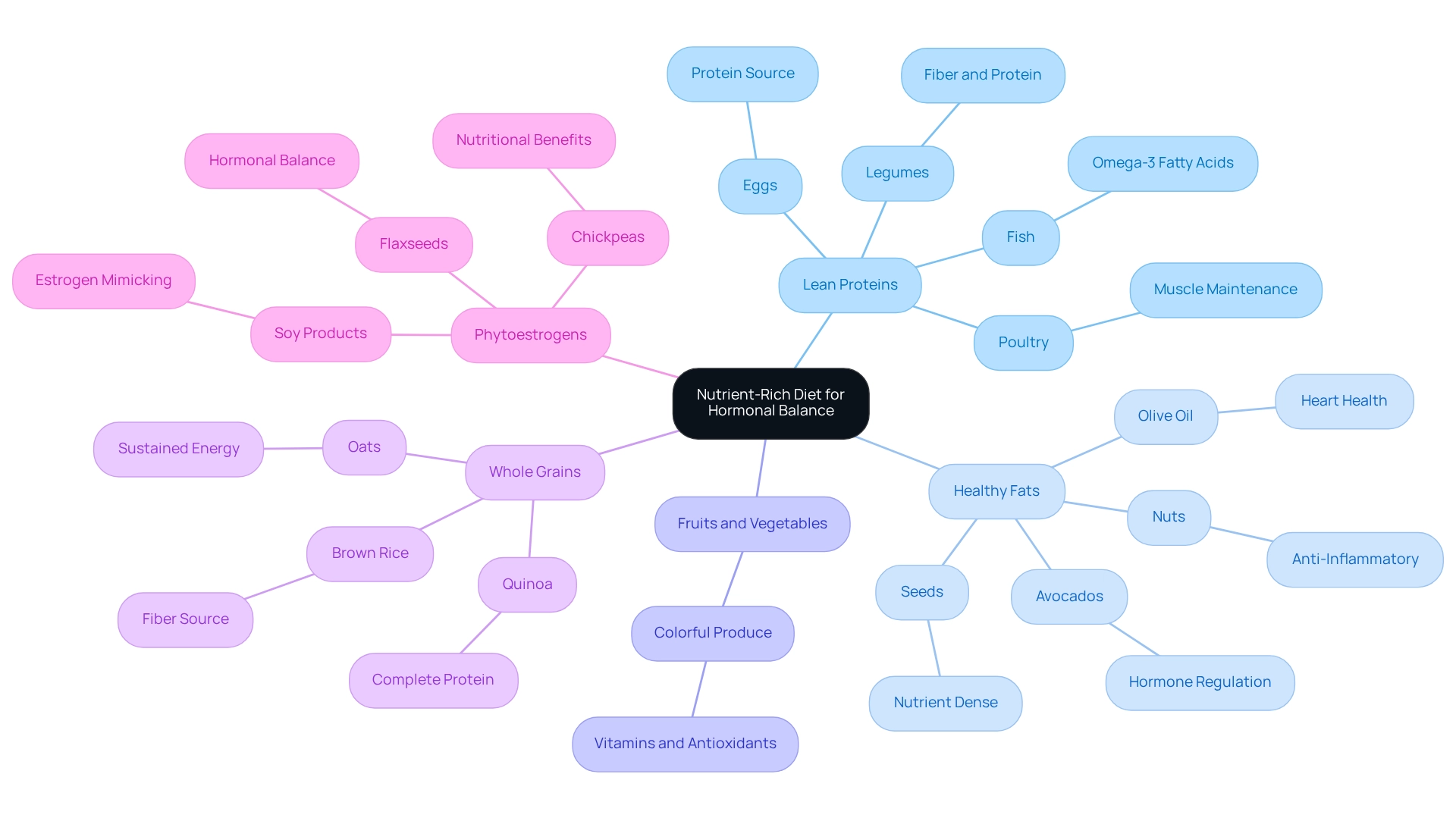4 Steps for Balancing Hormones in Menopause for Weight Loss
Overview
Balancing hormones during menopause is crucial for effective weight loss. This is primarily due to the decline in estrogen and progesterone levels, which significantly impacts metabolism and body composition. To navigate this transitional phase successfully, consider these four key steps:
- Implementing lifestyle changes
- Adopting a nutrient-rich diet
- Managing stress
- Seeking professional assistance
These collective actions support hormonal balance and promote overall wellness.
Furthermore, by making informed lifestyle choices, you can enhance your well-being during menopause. Adopting a nutrient-rich diet not only aids in weight management but also contributes to hormonal stability. In addition, managing stress effectively is essential, as stress can exacerbate hormonal imbalances. As a result, seeking professional guidance can provide tailored strategies to support your unique health needs.
In conclusion, balancing hormones during menopause is a multifaceted approach that requires attention to various aspects of health. By following these steps, you can foster a healthier, more balanced life during this significant transition.
Introduction
As women transition through menopause, they encounter a whirlwind of hormonal changes that can significantly impact their physical and emotional well-being. With declining levels of estrogen and progesterone, many experience weight gain, shifts in body composition, and alterations in mood and energy levels. Understanding these changes is crucial for developing effective strategies to manage health during this pivotal phase.
By embracing lifestyle modifications, adopting a nutrient-rich diet, and prioritizing emotional well-being, women can navigate the challenges of menopause with resilience. This article delves into the essential steps for achieving hormonal balance and effective weight management, offering insights that empower women to reclaim control over their health during this transformative journey.
Understand Hormonal Changes During Menopause
During menopause, significant hormonal changes occur, highlighting the importance of balancing hormones in menopause for weight loss, particularly the decline in estrogen and progesterone levels. These hormones are crucial for balancing hormones in menopause for weight loss, managing metabolism, body fat distribution, and appetite. As estrogen levels decrease, many women find that balancing hormones in menopause for weight loss becomes crucial, as they experience an increase in abdominal fat and a decrease in muscle mass, resulting in an average annual weight gain of 1.5 pounds among postmenopausal women. This increase in mass is primarily linked to the process of balancing hormones in menopause for weight loss. A cohort study highlights the variations in body composition among premenopausal, perimenopausal, and postmenopausal women, revealing that postmenopausal women generally have higher body fat percentages.
Furthermore, these hormonal changes can significantly affect mood, energy levels, and overall wellness. This underscores the importance of a comprehensive strategy for managing well-being during this transitional phase. Addressing these endocrine changes is vital for balancing hormones in menopause for weight loss strategies that prioritize not only physical health but also emotional and psychological well-being. It is essential to adopt a sustainable, research-supported approach for managing body mass in collaboration with a clinician to promote long-term wellness.
As Dr. Kelly Casperson aptly states, “We have a big problem,” emphasizing the challenges women face during this time. In addition, further research is needed to clarify the role of endocrine disruptors in estrogen-mediated pathways, which could provide deeper insights into the complexities of physiological changes and their impacts on weight gain.
Implement Lifestyle Changes for Hormonal Balance
To attain endocrine equilibrium during menopause and promote efficient weight loss, consider adopting the following lifestyle modifications focused on balancing hormones in menopause for weight loss:
- Regular Exercise: Aim for at least 150 minutes of moderate aerobic activity each week, complemented by strength training exercises at least twice a week. This combination not only helps maintain muscle mass but also boosts metabolism, which is crucial for weight management. Studies indicate that engaging in regular physical activity can significantly improve mood and overall well-being, making it easier to adhere to a balanced fitness routine.
- Quality Sleep: Prioritize sleep hygiene by establishing a consistent sleep schedule, creating a restful environment, and avoiding stimulants before bedtime. Quality sleep is essential for balancing hormones in menopause for weight loss, as inadequate rest can exacerbate menopausal symptoms and disrupt metabolic processes.
- Routine Health Assessments: Regular appointments with your healthcare provider are essential for monitoring hormone levels and overall well-being. The North American Menopause Society advises that all women be assessed for cardiovascular risk utilizing established evaluation tools, considering the transition as a factor. These check-ups enable timely interventions and modifications to your wellness strategy, ensuring that any imbalances in hormones are tackled swiftly, particularly in the context of balancing hormones in menopause for weight loss.
- Hydration: Staying well-hydrated is fundamental for supporting metabolic processes and can help alleviate some menopausal symptoms. Sufficient hydration is associated with enhanced energy levels and general well-being, making it a vital element of a balanced lifestyle during this phase. Additionally, eating fewer calories has been associated with a hazard ratio of 0.96 per 100 kcal for the reversal of metabolic syndrome, highlighting the importance of mindful eating in your dietary choices.
Adopt a Nutrient-Rich Diet to Support Hormones
A nutrient-dense diet is essential for balancing hormones in menopause for weight loss and sustaining balance during life’s transitions. Incorporating the following foods into your meals can significantly support this process:
- Lean Proteins: Sources such as poultry, fish, eggs, and legumes are vital for muscle maintenance and repair, particularly important as hormonal changes can affect muscle mass.
- Healthy Fats: Foods like avocados, nuts, seeds, and olive oil are essential for balancing hormones in menopause for weight loss, as well as for hormone regulation and inflammation reduction, contributing to overall well-being.
- Fruits and Vegetables: A diverse array of colorful produce ensures a broad spectrum of vitamins, minerals, and antioxidants, all of which are essential for optimal health during this stage of life.
- Whole Grains: Opt for whole grains such as quinoa, brown rice, and oats to provide sustained energy and fiber, aiding digestion and weight management.
- Phytoestrogens: Incorporating foods like soy products, flaxseeds, and chickpeas can aid in balancing hormones in menopause for weight loss by mimicking estrogen in the body, potentially alleviating some menopausal symptoms.
Research shows that a Mediterranean dietary pattern, abundant in these components, can have positive effects during the transition. As noted by Soundharya M. G., “Evidence indicates that a Mediterranean dietary pattern featuring whole grains, legumes, fruits, vegetables, low-fat dairy products, fish, olive oil, nuts, and seeds has positive effects during the transition phase of life for women.” Additionally, increased intake of soy products has been associated with reduced severity of menopausal symptoms.
Vitamins B6 and D also contribute significantly to managing hot flashes, as highlighted in the case study titled ‘Role of Vitamins in Managing Hot Flashes.’ This study emphasizes that while no single vitamin can completely eliminate hot flashes, maintaining sufficient levels of these vitamins, along with a balanced diet, can assist women facing hot flashes during this stage of life.
By focusing on these nutrient-rich foods, including recipes such as Berry Bowl, Vegan Tacos, and Soybean Ragu, menopausal women can effectively support balancing hormones in menopause for weight loss and improve their overall health.

Manage Stress and Emotional Well-Being for Weight Loss
Managing stress and emotional well-being is crucial for balancing hormones in menopause for weight loss. Studies show that stress can greatly affect body management, making it essential to adopt strategies that encourage emotional stability. Here are several effective approaches:
- Mindfulness and Meditation: Incorporating mindfulness techniques, such as meditation and deep breathing exercises, can significantly reduce stress levels and enhance emotional regulation. Research indicates that mindfulness techniques can lead to improved weight loss outcomes by fostering a healthier connection with food and body perception. A case study titled “Long-Term Impact of Mindfulness-Based Interventions on Obesity Treatment” highlighted the need for further research on the long-term effects of mindfulness in treating obesity. While mindfulness may offer benefits, its effectiveness in achieving sustained weight loss requires additional investigation.
- Physical Activity: Regular physical activity not only boosts mood but also helps mitigate stress. The Hunza Valley people exemplify how daily physical labor and walking serve as natural forms of exercise, promoting cardiovascular health and enhancing metabolic efficiency. Their lifestyle demonstrates that consistent physical activity is linked to better emotional well-being. Activities like yoga and tai chi are particularly beneficial, as they combine physical movement with mindfulness, promoting relaxation and emotional stability.
- Social Support: Maintaining strong social connections with friends and family is vital. Social support can alleviate feelings of isolation and anxiety, which are common during menopause. Participating in group activities or support networks can offer encouragement and motivation for weight loss efforts.
- Professional Assistance: If stress becomes overwhelming, seeking support from a mental wellness expert can be invaluable. Therapists can provide coping strategies and therapeutic interventions tailored to individual needs, helping to manage stress effectively.
Incorporating these strategies can lead to improved emotional well-being and support balancing hormones in menopause for weight loss. Mindfulness practices, in particular, have shown promise in helping women navigate the challenges of this life stage. As noted by Renata Bressan Pepe, one of the authors of the study, “The integration of mindfulness practices may inform future obesity treatment strategies, emphasizing the importance of a holistic approach to health and wellness.
Conclusion
Navigating menopause is a multifaceted journey that necessitates a comprehensive understanding of the hormonal changes occurring during this phase. The decline in estrogen and progesterone levels can lead to weight gain, shifts in body composition, and emotional fluctuations. Recognizing these changes is the first step toward developing effective strategies for health management. Emphasizing lifestyle modifications, such as regular exercise, quality sleep, and routine health check-ups, can significantly aid in achieving hormonal balance and effective weight management.
Adopting a nutrient-rich diet plays a pivotal role in supporting hormonal health. Incorporating lean proteins, healthy fats, fruits, vegetables, and whole grains provides essential nutrients that help alleviate menopausal symptoms and promote overall wellness. Furthermore, the inclusion of phytoestrogens can mimic estrogen’s effects in the body, potentially easing some challenges faced during this transition.
Equally important is the management of stress and emotional well-being. Techniques such as mindfulness, physical activity, and social support are invaluable in fostering emotional balance. By prioritizing mental health alongside physical health, women can enhance their resilience throughout menopause.
Ultimately, the journey through menopause can be navigated with knowledge, proactive health measures, and a supportive community. With the right strategies in place, women can reclaim control over their health and well-being, embracing this transformative phase of life with confidence and strength.
Frequently Asked Questions
What hormonal changes occur during menopause that affect weight loss?
During menopause, there is a significant decline in estrogen and progesterone levels, which are crucial for managing metabolism, body fat distribution, and appetite.
How do hormonal changes during menopause impact body composition?
As estrogen levels decrease, many women experience an increase in abdominal fat and a decrease in muscle mass, leading to an average annual weight gain of 1.5 pounds among postmenopausal women.
What is the relationship between menopause and body fat percentage?
A cohort study indicates that postmenopausal women generally have higher body fat percentages compared to premenopausal and perimenopausal women.
How do hormonal changes during menopause affect overall wellness?
These hormonal changes can significantly impact mood, energy levels, and overall wellness, highlighting the need for a comprehensive strategy for managing well-being during this transitional phase.
What approach is recommended for managing weight during menopause?
It is essential to adopt a sustainable, research-supported approach for managing body mass in collaboration with a clinician, focusing on both physical health and emotional well-being.
What further research is needed regarding menopause and weight gain?
Further research is needed to clarify the role of endocrine disruptors in estrogen-mediated pathways, which could provide deeper insights into the complexities of physiological changes and their impacts on weight gain.






